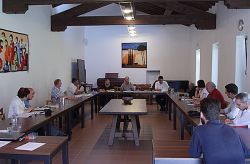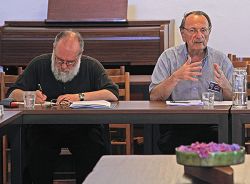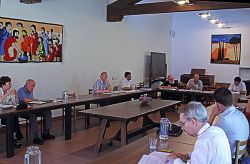The Roman primacy in the first millennium
From 24 to 26 July 2012, on the initiative of the prior, br Enzo, and under the direction of fr Hervé Legrand, a French Dominican, friend of the community, professor emeritus of the Institut Catholique of Paris, and authoritative member of various commissions of ecumenical dialogue, a study seminar was held in Bose on the topic of the Petrine primacy in the widest context of the life of the Eastern and Western Churches in the first millennium.
Responding to br Enzo’s invitation to follow up the prayer of pope John Paul II, “May the Holy Spirit grant us his light and illumine all pastors and theologians of our Churches, so that we can seek, clearly together, the forms in which this ministry can carry out a service of love that is recognized by both” (Ut unum sint 95), already in October 2010 professor Legrand had gathered in Bose a first group of six scholars engaged in the project. In this way, the first work session of this scientific committee inaugurated the long, patient, preparation of the July session, in which participated about fifteen experts, who came from important university centers of France, Germany, Italy, Belgium, United States, Greece, and Lebanon. Among those invited, all of recognized academic level, there were also members and consultors of various ecumenical bodies and international commissions for theological dialogue between the Churches.
Without interfering with the official dialogue, the study group that met in Bose, with the intention of placing itself at the service of the Churches, chose to treat the question from the historical standpoint. If it is true, as was affirmed in 1976 by the then professor Joseph Ratzinger, that “with regard to the doctrine of primacy, Rome cannot seek from the East more than was formulated and practiced in the first millennium”, it is in fact essential to arrive first of all at establishing a historical dossier, rather than a theological one, on a basis shared as far as possible. For this it was fundamental to have the participation of Catholic, Orthodox, and Protestant participants, all committed to a common research, which, just because it wants to be scholarly, can go beyond the respective purely confessional perspectives. Not by chance, it was decided, among other things, to aim not so much at what we may call “history of ideas”, but rather at “history of institutions”, seeking to observe, as much as it is possible on the basis of available documentation, their effective functioning within the ecclesiastical and political context of those times. Without claiming to arrive immediately at practical solutions, the work was carried out in a rigorously historical perspective, with the main preoccupation of stating the problem in methodologically correct terms. The long-term hope (the group will return to meet to work again together) is of sketching a shared “ecclesiastical semantics” because it is on a historical foundation, that is, of proposing to the Churches, as a humble offering in service to dialogue, a vocabulary and a synthesis on a common basis, an instrument of work at the disposition of all.
The small number of participants permitted the discussions to proceed in a really seminar mode, which favored a systematic, exact, and in-depth comparison, in view also of a publication, which will try to be not a simple collection of the different talks, but in fact the fruit of teamwork, in which the contribution of each will take into account the observations of the others. In this sense the days were demanding, with intensive work rhythms, a work conducted always in a fraternal climate, in which was not lacking also a convivial meeting with the community, which follows and supports this research activity with particular attention. To return to the first millennium is to appeal to an experience of Church that induces reflection on the modality of living primacy and communion among the Churches; it is an occasion to rethink the communio ecclesiae as communio ecclesiarum.
Scientific commitee
Philippe Blaudeau, University of Angers and IUF, France
Theresia Hainthaler, Hochschule Sankt-Georgen, Frankfurt a.M., Germany
Hervé Legrand, Catholic Institute, Paris, France
Enrico Morini, University of Bologna, Italy
Konstantinos G. Pitsakis, Democritus University of Thrace, Komotini, Greece
David Wagschal, St Vladimir’s Seminary, Crestwood, New York, USA
Eckhard Wirbelauer, University of Strasbourg, France
Members of the Study Group
Frédéric Alpi, CNRS and Institut français du Proche-Orient, Beirut, Lebanon
Cesare Alzati, Sacred Heart Catholic University, Milan, Italy
Philippe Blaudeau, University of Angers and IUF, France
Brian E. Daly, University of Notre Dame, Indiana, USA
Theresia Hainthaler, Hochschule Sankt-Georgen, Frankfurt a.M., Germany
Jan-Markus Kötter, Heinrich Heine University, Düsseldorf, Germany
Hervé Legrand, Catholic Institute, Paris, France
Gaetano Lettieri, University of Rome La Sapienza, Italy
Enrico Morini, University of Bologna, Italy
Michel-Yves Perrin, École Pratique des Hautes Études, Paris, France
Vlassios Pheidas, University of Athens and Institut d’Études Supérieurs en Théologie Orthodoxe, Chambésy, Switzerland
Konstantinos G. Pitsakis, Democritus University of Thrace, Komotini, Greece
Klaus Schatz, Hochschule Sankt-Georgen, Frankfurt a.M., Germany
Monika Schuol, Free University of Berlin and Carl von Ossietzky University, Oldenburg, Germany
Herman Teule, Institute of Eastern Christian Studies, Radboud University, Nijmegen, The Netherlands
Eckhard Wirbelauer, University of Strasbourg, France
Ugo Zanetti, Chevetogne Monastery, Belgium
* In these days we have had two pieces of news that touch the life of the group. Professor Konstantinos G. Pitsakis has dies, an eminent scholarly personality, who knew to look with deep wisdom and discernment on the life of the Church and of men, as we have expressed in our message of affectionate nearness to his family. Professor Brian E. Daley, S.J., an eminent scholar of the fathers of the Church, has been awarded the Premio Ratzinger, a kind of Nobel of theology instituted to stimulate theological reflection, especially in the fields most cultivated by Joseph Ratzinger as theologian, cardinal, and now pope: the fields of fundamental theology, of the history of theology, especially patristic theology, the field of Biblical exegesis, but also of dogmatic theology, The prize will be conferred by Benedict XVI on 20 October, during the bishops’ synod on the “new evangelization”. We rejoice with fr Brian, with the University of Notre Dame, and with the Society of Jesus!


